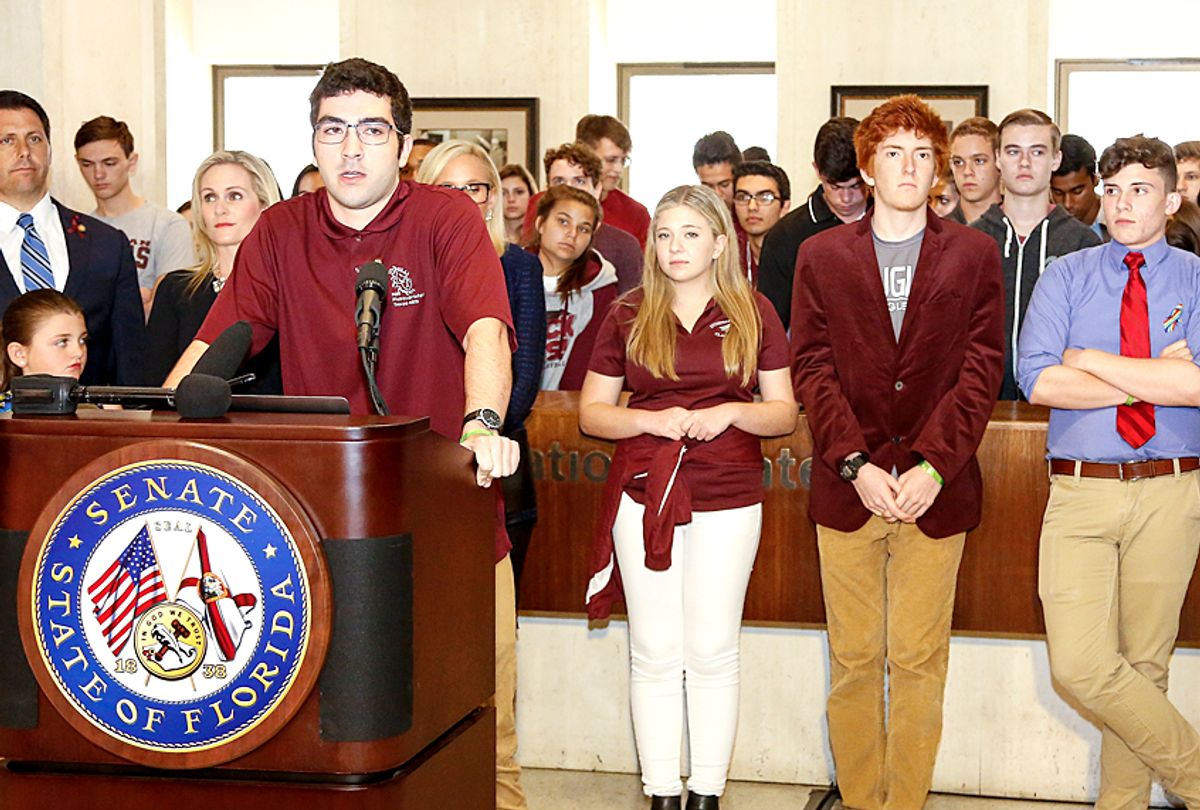When 17 people were killed at Marjory Stoneman Douglas High School in Parkland, Florida, it was just the latest in a tragic list of mass shootings, many of them at schools.
Then something different happened: Teens began to speak out. The Stoneman Douglas students held a press conference appealing for gun control. Teens in Washington, D.C., organized a protest in front of the White House, with 17 lying on the ground to symbolize the lives lost. More protests organized by teens are planned for the coming months.
Teens weren’t marching in the streets calling for gun control after the Columbine High School massacre in 1999. So why are today’s teens and young adults — whom I’ve dubbed “iGen” in my recent book on this generation — speaking out and taking action?
With mass shootings piling up one after another, this is a unique historical moment. But research shows that iGen is also a unique generation — one that may be especially sensitive to gun violence.
Keep me safe
People usually don’t think of teenagers as risk-averse. But for iGen, it’s been a central tenant of their upbringing and outlook.
During their childhoods, they experienced the rise of the helicopter parent, anti-bullying campaigns and, in some cases, being forced to ride in car seats until age 12.
Their behavior has followed suit. For my book, I conducted analyses of large, multi-decade surveys. I found that today’s teens are less likely to get into physical fights and less likely to get into car accidents than teens just 10 years ago. They’re less likely to say they like doing dangerous things and aren’t as interested in taking risks. Meanwhile, since 2000, rates of teen binge drinking have fallen by half.
With the culture so focused on keeping children safe, many teens seem incredulous that extreme forms of violence against kids can still happen — and yet so many adults are unwilling to address the issue.
“We call on our national and state legislatures to finally act responsibly and reduce the number of these tragic incidents,” said Eleanor Nuechterlein and Whitney Bowen, the teen organizers of the D.C. lie-in. “It’s essential that we all feel safe in our classrooms.”
Treated with kid gloves
In a recent analysis of survey data from 8 million teens since the 1970s, I also found that today’s teens tend to delay a number of “adult” milestones. They’re less likely than their predecessors to have a driver’s license, go out without their parents, date, have sex, and drink alcohol by age 18.
This could mean that, compared to previous generations, they’re more likely to think of themselves as children well into their teen years.
As 17-year-old Stoneman Douglas High School student David Hogg put it, “We’re children. You guys are the adults. You need to take some action.”
Furthermore, as this generation has matured, they’ve witnessed stricter age regulations for young people on everything from buying cigarettes (with the age minimum raised to 21 in several states) to driving (with graduated driving laws).
Politicians and parents have been eager to regulate what young people can and can’t do. And that’s one reason some of the survivors find it difficult to understand why gun purchases aren’t as regulated.
“If people can’t purchase marijuana or alcohol at the age of 18, why should they be given access to guns?” asked Stoneman Douglas High School junior Lyliah Skinner.
She has a point: The shooter, Nikolas Cruz, is 19. Under Florida’s laws, he could legally possess a firearm at age 18. But — because he’s under 21 — he couldn’t buy alcohol.
Libertarianism — with limits
At the same time, iGen teens — like their millennial predecessors — are highly individualistic. They believe the rights of the individual should trump traditional social rules. For example, I found that they’re more supportive of same-sex marriage and legalized marijuana than previous generations were at the same age.
Their political beliefs tend to lean toward libertarianism, a philosophy that favors individual rights over government regulations, including gun regulation. Sure enough, support for protecting gun rights increased among millennials and iGen between 2007 and 2016.
But even a libertarian ideologue would never argue that individual freedom extends to killing others. So perhaps today’s teens are realizing that one person’s loosely regulated gun rights can lead to another person’s death — or the death of 17 of their teachers and classmates.
The teens’ demands could be seen as walking this line: They’re not asking for wholesale prohibitions on all guns. Instead, they’re hoping for reforms supported by most Americans such as restricting the sale of assault weapons and more stringent background checks.
In the wake of the Stoneman Douglas High School shooting, the teens’ approach to activism — peaceful protest, a focus on safety and calls for incremental gun regulation — are fitting for this generation.
Perhaps iGen will lead the way to change.



Shares